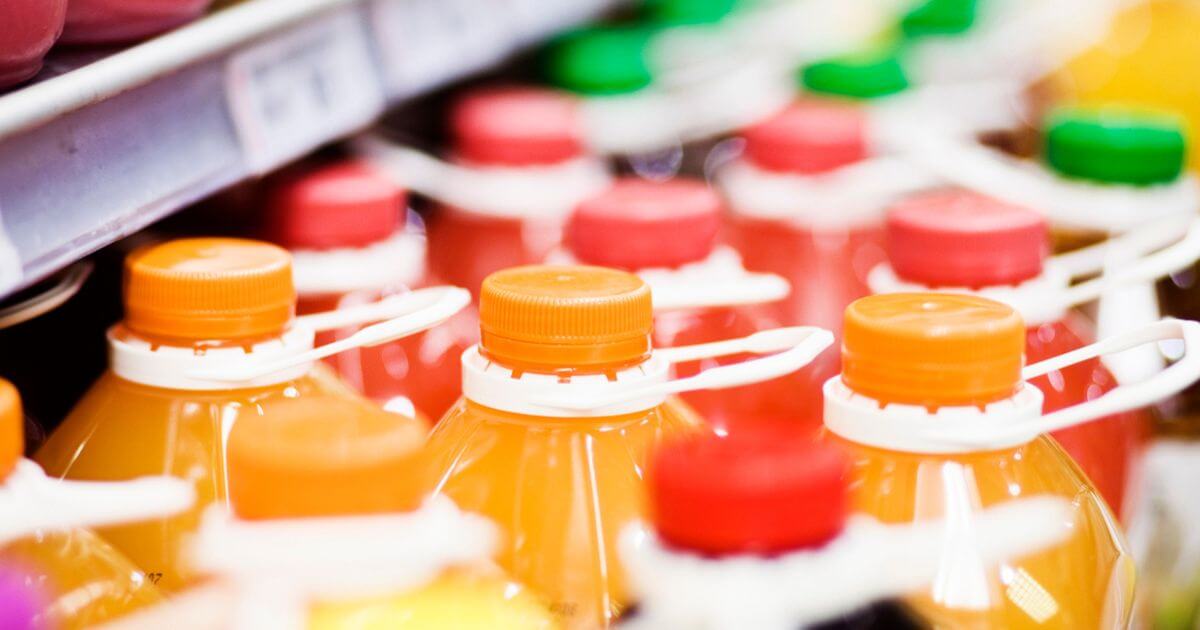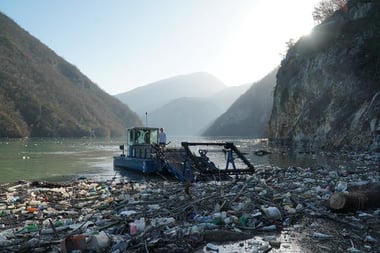.jpg)
Dan Coppins
Dan has been in the world of packaging since 2014, supporting global brands and factories by helping them develop, test, and trial packaging from concept to launch. Some of his highlights include overcoming production challenges and logistics, helping contract manufacturers develop other company brand products, and dealing with the technical elements throughout the whole process. Sustainability runs at the core of all the work Dan does, to ensure a considered future, and appropriate, realistic targets are set through sharing knowledge, innovations, and technology.
Governments around the world are implementing new legislation to tackle key issues around plastic pollution, helping us move to a more circular economy. Extended Producer Responsibility (EPR) laws in particular are gaining traction around the world, with the UK launching new rules in 2024.
Want to learn more about EPR law in the UK? Read on to find out everything you need to know, including what EPR actually is, how it’ll work, and what brands need to do to be compliant.
Once you're up to date with EPR regulation, it's time to get your company's plan in place — that's where we come in. You can partner with CleanHub to collect plastic as part of your EPR program. All you need to do is get in touch with our in-house team of experts, who can help you choose the right plan to suit your business’s needs.
What’s on this page?
01 | What is Extended Producer Responsibility (EPR)?02 | How will EPR work in the UK?
03 | When will the new UK EPR law come into place?
04 | Which businesses are affected by the EPR law?
05 | How to make your business EPR-compliant
06 | What are the benefits and challenges of the EPR law?
07 | FAQs
What is Extended Producer Responsibility (EPR)?
Extended producer responsibility (EPR) is legislation that aims to make producers responsible for the cost of the collection, management, and recycling of packaging.
It also incentivizes producers to make their products more recyclable by adding modulation fees, which are based on the recyclability of products.
This essentially means the government will adjust the price of the fees, encouraging businesses to decrease their impact on the environment — the more recyclable the material, the lower the price.
Ultimately, the key goal of EPR is to reduce unnecessary packaging, improve the quality of materials, and reduce litter across the country. The scheme makes this possible by channeling the money from the fees into the collection, management, recycling, and disposal of household waste and street bins.
Want to learn more? Check out our page: What is Extended Producer Responsibility?
How will EPR work in the UK?
The UK government is introducing a new EPR law in 2024, meaning some businesses will need to make adjustments to their operations to be compliant.
It’s worth noting that EPR laws vary, depending on the country you’re in. In the UK, businesses will need to start by submitting packaging data to a registered scheme administrator.
These administrators will then calculate the cost of the fee (while also monitoring prices between comparable local authorities), and the business will need to pay this each quarter throughout the year.
Some businesses will also be required to collect additional ‘nation’ data within the UK — this is information about which nation in the UK packaging is supplied in, and which nation in the UK packaging is discarded in.
Your company will be obligated to submit nation data if it:
- Supplies filled or empty packaging directly to customers in the UK, where they are the end users of the packaging
- Supplies empty packaging to UK organizations that are either not legally obligated, or are classed as a small organization
- Hires or loans out reusable packaging
- Owns an online marketplace where organizations that are based outside the UK sell their empty packaging and packaged goods to UK consumers
- Imports packaged goods into the UK for your own use and discard the packaging
Key dates to be aware of
- 31st March 2024 — Submit 2023 data to a registered administrator
- 1st December 2024 — Submit your nation data for the 2023 calendar year
- 31st March 2026-31st March 2027 — Introduce mandatory ‘Recycle Now’ on packaging labels
The difference between the UK’s EPR and PRN schemes
There is currently no EPR law in place in the UK. Instead, a scheme known as Shared Producer Responsibility (SPR) exists, through the use of the Packaging Recycling Notice (PRN).
Unlike an EPR system, the current PRN scheme was not designed to cover businesses’ full collection, sorting, and recycling costs. It was designed to create more money in the system by encouraging recycling when targets were not being met and reducing costs when they were.
This means there is no set price for PRNs, and prices fluctuate significantly. The cost of the PRN system is a shared obligation between raw material companies, converters, packer fillers, and sellers — rather than having one point of compliance.
The PRN system will continue to be used alongside the new EPR scheme to show that recycling obligations have been met. However, there will be modifications to the PRN system to address some of the issues with this system and the government has consulted on these — namely, it will have a single point of compliance when EPR comes in.
When will the new UK EPR rules come into place?
Businesses need to submit their initial data for EPR by 31st March 2024.
According to the UK government, businesses will not have to pay any EPR for packaging fees in 2024 — but must still follow EPR guidance and report packaging data. You must also continue to pay any fees due under previous regulations.
Your waste management fee will initially be calculated based on the packaging you’ve reported as ‘household packaging’.
Want to compare these rules to other countries? Check out our guide on EPR in the US.
Which businesses are affected by the EPR law in the UK?
All producers will be affected by the new EPR law to some degree — but some are required to cover more costs than others.
The following producers will be responsible for 100% of the EPR charges:
- Brand owners – This includes companies that package goods and sell them under their brand name. If a brand is not identifiable, then the obligation would fall to the organization that carried out the packing or filling of the packaging
- Importers – Companies that import filled packaging
- Service providers – Companies that hire out or lend reusable packaging
- Distributors – Companies that manufacture or import empty packaging and sell it to anyone who is not an obligated producer
- Online marketplaces – Companies that operate a marketplace, where non-UK sellers can sell filled or empty packaging to UK consumers
- Sellers – Companies that sell filled packaging to the end consumer
It’s also worth bearing in mind that large businesses — with a turnover of £2 million or more, as well as handling at least 50 tonnes of packaging — are obligated to report packaging data and pay the tax. Small businesses, On the other hand — with a turnover of £1 million, as well as handling 25 tonnes of packaging — will need to report packaging placed on the market but not financially contribute.
Packaging definition for EPR: The term ‘packaging’ refers to any material that is used to cover or protect goods that are sold to users. It also includes anything that’s designed to be filled at the point of sale, such as a coffee cup, or makes items look appealing for marketing purposes.
How to make your business EPR-compliant
To make sure your business is EPR-compliant, you need to assess all of the packaging, components, and materials used throughout operations.
Bear in mind that the data required for the EPR law is much more detailed than the existing PRN scheme. So if your business isn’t collating this data yet, it’s important to make this a priority moving forward. Remember, data submissions for 2023 need to be submitted by the 1 December 2024 at the latest.
To comply with the UK’s news EPR regulations, business need to:
- Record data about the empty packaging and packaged goods you supply or import in the UK. This should be recorded from either 1 January 2023 or 1 March 2023
- Report data about empty packaging and packaged goods you supplied or imported. From 2025, you’ll also need to pay a fee to the environmental regulator for this
The deadline for reporting depends on which nation your organization is based in, and you may also need to report nation data.
The compliance requirements will also vary depending on the size of the business. Unlike small organizations, large companies might need to:
- Create an account for your organization
- Pay a waste management fee
- Pay scheme administrator costs
- Pay a charge to the environmental regulator
- Get PRNs (Packaging Recycling Notice) or PERNs (Packaging Export Recovery Note) to meet your recycling obligations
- Report data about empty packaging and packaged goods you supplied or imported
Good to know
It’s always good to stay ahead of the curve — and these are the key factors to be aware of in the coming years.
- Packaging will have mandatory labeling, with the ‘Recycle Now’ mark being used along with either 'recycle' or 'do not recycle'. This needs to be implemented by 31 March 2026, so there is a little more time to get organized
- Plastic film and flexibles will not need to be labeled until 31 March 2027. For unfilled packaging, the manufacturer will need to provide recyclability information but the purchaser will need to factor in any alterations they make and their impact on recyclability.
- If you’re in the process of new product development, it’s worth introducing the Recycle Now marks into new artworks that are destined for the UK market.

EPR penalties to be aware of
The UK government will introduce penalties for businesses that miss the deadline to submit the data. However, much like the modulated fees, these costs have not been set yet.
It is believed that the fees will be significant, as this EPR will be a regulation for all businesses that provide products in packaging.
What are the benefits and challenges of the EPR law?
The main benefit of the UK’s new EPR legislation is that it fills a financial gap in the current waste collection system.
The new EPR law will be brought in on top of the existing PRN system, which was introduced in 1997 with the goal of supporting the UK recycling system and introducing a shared responsibility for the packaging put to market.
Since the PRN’s introduction, there has been a marked increase in products on the market, as well as the way we consume products – resulting in a significant increase in packaging. At the same time, there have been no significant changes to the scheme.
As a result, a huge financial gap has been created in the collection of waste, which has largely been passed to local councils through tax.
The new EPR law aims to raise an estimated £1.7 billion per year for all packaging types.
But there are also challenges to implementing this EPR law — the main one being that all businesses need to be notified of these new charges and should make sure they’re compliant before introducing the scheme.
The packaging waste recycling target also poses a challenge for the UK EPR law — currently standing at 51% for 2024, and increasing to 62% by 2030.
This target takes into account the introduction of a collection scheme for films and flexibles by March 2027. Prior to these targets, the packaging waste business recycling target for 2023 will be the same as 2022, to allow businesses to prepare for the introduction of EPR in 2024.
Summary
The UK's EPR law is coming, and it’s a significant change to the packaging waste system.
There will be challenges for many businesses — both through the collation of data and the administrator fees — but hopefully this article has helped you wrap your head around the legislation.
Remember, it’s important to start gathering your business’s packaging data ahead of the key deadlines, otherwise you could be on the receiving end of a hefty fine. If you’re not sure where to start with this, it could be worth getting support from a consultant in packaging.
Once you're up to date with EPR regulation, it's time to get your company's plan in place — that's where we come in. You can partner with CleanHub to collect plastic as part of your EPR program. All you need to do is get in touch with our in-house team of experts, who can help you choose the right plan to suit your business’s needs.
FAQs
Does the UK have an EPR law?
Yes, the UK government is introducing a new EPR law in 2024. This means some businesses will need to make some adjustments to their operations to be compliant.
Although the new legislation is coming into place in 2024, the government has stated that businesses will not have to pay any EPR for packaging fees this year — but must still follow EPR guidance and report packaging data.
Is EPR replacing PRN?
Once the new UK Extended Producer Responsibility (EPR) law comes into place in April 2024, it will run alongside the existing Packaging Waste Recovery Note (PRN) and Packaging Waste Export Recovery Note (PERN) systems. Businesses can expect this to continue until at least 2026.
What does EPR stand for in the UK?
EPR stands for Extended Producer Responsibility. In the UK, this legislation will change the way UK businesses carry out their recycling responsibilities. Companies impacted by this legislation will need to report their packaging data — with some also having to pay fees.

.webp)

.webp?width=380&name=Plastic-water-bottles%20(1).webp)

.png?width=380&name=CleanHub%20Bcorp%20(1).png)
.webp?width=380&name=CleanHub-collectors-%20(1).webp)
.webp?width=380&name=ESG-meeting%20(1).webp)

.webp?width=380&name=wave%20(1).webp)
.webp?width=380&name=Beach-clean%20(1).webp)
.webp?width=380&name=warehouse%20(1).webp)
